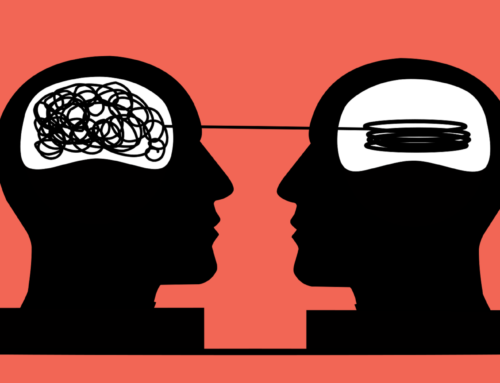It happens to the best of us: an inability to concentrate at work, panic in traffic, or thoughts that are too scattered or busy to let us fall asleep. But for others, constant racing thoughts can become an uncomfortable, but consistent, part of everyday life. And mental health professionals want people to know the difference.
“Occasional periods of racing thoughts are nothing to be terribly concerned about as they could be related to a reasonable worry,” Dr. Nicole Washington, psychiatrist and the Chief Medical Officer at Elocin Psychiatric Services, PLLC, tells Bustle. “Even a reasonable stressor can lead to moments of feeling like your thoughts are racing.” So it’s important, first and foremost, to assess whether you’re simply having a proportionate reaction to the stressors in your life. And even then, if you’re finding trouble coping, it’s OK to reach out for help.
But sometimes a legitimate diagnosis is necessary. “Racing thoughts are usually associated with anxiety disorders, panic attacks, OCD and ADD, as well as the manic phase of Bipolar Disorder,” Cali Estes, PhD., therapist and founder of The Addictions Academy, tells Bustle. “If your heart rate is elevated and you feel like you are in a constant state of panic, then you might have anxiety or an anxiety disorder and you should be evaluated by a professional.” Cyclothymia, a mood disorder that causes emotional highs and lows, is another example. Regardless of where you might fall in the DSM-V, however, you deserve to care for your mental health, and to be able to spot potentially concerning symptoms.
These are seven ways to tell if your racing thoughts are actually a mental health issue, according to experts.
1. You’re Finding It Impossible To Focus
Being unable to focus can happen now and again. But if this has become a constant struggle for you, then it’s possible you’re dealing with a deeper problem than a stress response.
“If you are finding that you’re frustrated with your focus, things that used to take you a few hours to complete are now taking all day, or [you] feel like you’re constantly behind on your projects, this is a sign that you could benefit from therapy,” psychotherapist Emily Roberts, MA, LPC, tells Bustle, ” … It may be as simple as having someone help you with accountability or be a sign of executive functioning challenges [meaning difficulties with paying attention, organizing, and completing tasks], both of which can be determined when you get a professional’s perspective.” Being able to focus is important for a lot of aspects of life, and professional help can get you back on your feet in that regard.
2. The Thoughts Are Very Time Consuming
It’s one thing if your thoughts hit you at a certain time during the day, or once a week even. Having incessant racing thoughts, however, can be a bigger problem
“[It’s a sign of a bigger issue if] the racing thoughts take up a great deal of the day and are time consuming,” Dr. Washington says. So seek help if you absolutely cannot stop the thoughts from coming, no matter the time of day. You deserve a break.
3. Your Thoughts Are Disrupting Your Sleep
You need to get your sleep. If your thoughts are completely ruining your chances at being well-rested, experts agree that it’s time to get help. “[Be careful if the thoughts] interrupt your sleep,” Dr. Washington says. “Some people with anxiety disorders have a hard time falling asleep due to difficulty shutting their brains off.” A therapist can help you navigate this, and teach you some skills to settle into sleep easier.
It’s worth noting that if your incessant racing thoughts at night are coupled with particularly dark themes or imagery, it’s even more urgent to seek help. “[Be aware of] racing thoughts that are destructive in nature or impede sleep,” Dr. Estes says. “If the thoughts you are having are leading you down a dark path, occurring throughout the night, [or] disrupting your sleep, you need to seek the advice of a professional.” Basically, if your thoughts turn into nightmares of their own, it’s worth seeking some outside support.
– Eva Taylor Grant
Read more: 7 Ways To Tell If Your Racing Thoughts Might Actually Be A Mental Health Issue








Why do each of these points have photographs of women only?
I did some research looking at the unacknowledged trauma of adults who survived parents with a severe mental illness (see: https://minerva-access.unimelb.edu.au/handle/11343/37852). Sometimes unresolved and untreated early trauma can cause some all of the points mentioned. It does not mean there is a mental illness necessarily. Remember, trauma is a normal response to an abnormal event(s).